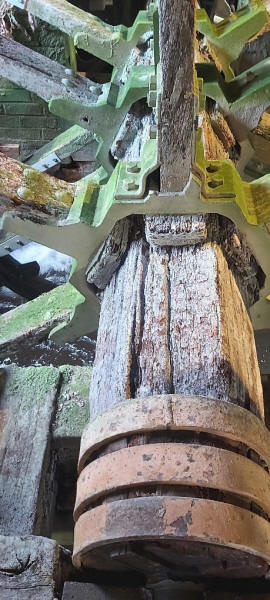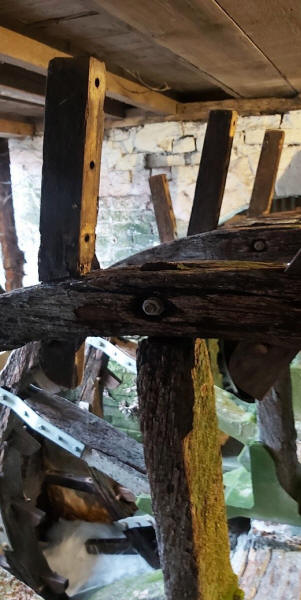|
   |
|
Page 3 |
Newsletter 142 August 2023 © Hampshire Mills Group |
|
City Mill, Winchester
Paul Bracey, Volunteer Miller and Room Guide
|
|
Things have changed since former miller Martin
Gregory wrote in newsletter 119 (2017) about
structural repairs required after serious flooding
in 2014. Ruth Andrews reported in 122 (2018) about
the HMG visit hosted by former mill manager Ric
Weeks, to see repairs in progress. This piece
brings you up to date with events since then.
Flood damage repairs and asbestos removal works in
the former YHA hostel undercroft washroom area seen
by the HMG group were completed by the end of 2019.
Asbestos remediation returned 50m2 of eastern
undercroft floor space to mill use. That, along
with commercial considerations, led to the National
Trust (NT) deciding to divide the upper ground floor
in half with an oak framed glazed screen, creating a
café at the far end. This opened in December 2019,
and immediately became a popular Winchester ‘must
visit’. As a result of the flooding, structural
engineers checked lateral stability of the front
gable wall under pressure from the water build up
down below. It transpired that the front wall had
been on the brink of collapsing towards City Bridge
during flooding. It has now been suitably
strengthened without visual impact.
|
|
On 20 March 2020, all National Trust properties were
completely closed due to Covid 19. During the 16
month public closure, mill machinery was regularly
turned over, and limited flour milling was
undertaken by a few staff and volunteers for three
or four months. This enabled some commercial flour
sales to continue for a while. There were several
mechanical issues during this time – an axle tree
cross winged gudgeon bearing worked very loose and
had to be re-packed. This had also happened in 2018
and 2019 as a result of incipient shaft rot near the
bearing. Pit wheel wedges also worked loose,
causing pit wheel and wallower to come out of mesh.
No permanent damage resulted, due to prompt shutdown
by millers. These problems were dealt with by the
millwright.
City Mill did not reopen its doors to the public
again until 10 June 2021. Machinery continued to be
turned over by staff, but weekend milling did not
resume properly until November 2021 due to technical
and administrative issues. These included more
stringent NT food safety audit standards affecting
flour handling.
However, milling quickly settled down, with
production around 40-80kg of wholemeal flour per
week. Commercial sale of flour did not return, as
all flour produced was easily sold in the mill shop.
The millwright resumed his normal twice yearly
inspections.
|
 |
|
Millers will know that the axle tree end bearing
problem previously referred to is indicative of
serious rot in the oak. This led to launch of a
£75,000 fundraising appeal to facilitate replacement
of the now 28 year old main axle tree. Further
deteriorations meant the millwright’s November 2022
inspection report included a ‘red list’ of
additional machinery problems that millers were
asked to keep an eye on. These included badly worn
timber pit wheel cogs (installed in 2006-7), oak
waterwheel frames and starts (2005), main timber
vertical shaft bridge beam and a timber trestles
supporting the same (2004). Milling continued
satisfactorily up to New Year’s Day 2023. After
then, machinery operations were stopped due to high
water levels in the Itchen.
|
 |
During a stone clean and machinery test run on 27
January 2023 (after river levels had dropped), it
was noticed that a float complete with starts was
missing, lost downstream. After closer inspection
of the wheel frame felloes, the millwright stopped
all milling and turning of machinery pending
replacement or refurbishment of the 1995 axle tree
and red list items. All ironwork remains in good
condition. Floats were removed to stop accidental
turning of the machinery. Fundraising was
re-launched with a new £130,000 target. 25% of that
has been raised so far. The fundraising team have an
HLF application in progress, and several other
fundraising possibilities are also being assessed.
Total flour production since demonstration milling
started in 2004 is believed to be around 140
tonnes.
So perhaps the timber items to be replaced have
performed quite well.
As part of necessary external refurbishment works,
the island garden is currently closed for complete
strip out and major reconstruction/reconfiguration
of the overgrown 1978 layout. Abbotstone Mill’s
burr stones used by City Mill in 2004-5 will remain
within the new garden layout which is due to be
re-opened soon.
City Mill has been through many challenging times
throughout its recorded 1091 year history. Perhaps
a few machinery problems with readily available
solutions are not so bad! The building fabric
remains sound. Visitor numbers are now close to pre-Covid
times, so public interest is still strong.
Visits to the mill and café are now free, but
donations to the restoration fund are welcomed. A
programme of events aimed at fundraising is on the
City Mill website. The City Mill's page on
this website is
here.
|
|
|
